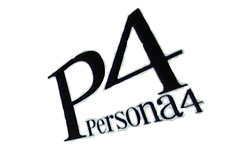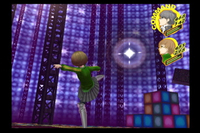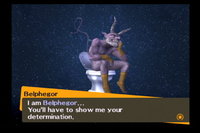|
|

|
PLATFORM
|
PS2
|
BATTLE SYSTEM
|

|
INTERACTION
|

|
ORIGINALITY
|

|
STORY
|

|
MUSIC & SOUND
|

|
VISUALS
|

|
CHALLENGE
|
Moderate
|
COMPLETION TIME
|
60-80 Hours
|
|
OVERALL

|
+ Gripping story with great twists and turns to keep you guessing.
+ Characters can protect you in combat and provide other support.
+ Solid script, humorous dialogue, and strong characters.
- First ten hours are painful to slog through.
- Shuffle Time sucks. A lot.
- Disappointing ending.
|
Click here for scoring definitions
|
|
|
The Persona series has really evolved over the years and has become a cult favourite amongst RPG fans. It's a series that has strengths not only in storytelling and gameplay, but also in creating a mystery that players often find themselves wanting to be entangled in. While Persona 3 focused more on apocalyptic themes, Shin Megami Tensei: Persona 4 is more of a detective film-noir with snappy dialogue, fun characters, and a plot full of twists and turns, taking the player on a roller coaster ride that may never be forgotten. However, it's not an entirely smooth ride.
Much like Persona 3, the game begins with the player entering the shoes of a nameless protagonist who has just moved to live with his uncle and cousin in the boonies. Like a typical high school student, he transfers to a new school, makes new friends, and studies for his exams. On his first week in Inaba, however, a young female TV announcer is murdered, and rumors spread of "The Midnight Channel," which only appears on rainy evenings when one stares at a blank TV. Each person that appears on The Midnight Channel is a potential victim, and it is up to the protagonist and his friends to save each possible victim that appears on TV before another murder occurs. This essentially begins the mystery that surrounds Persona 4. For the most part, this story is incredibly strong and it constantly leaves the player guessing as to who the true culprit is, but much like a roller coaster, it has to build momentum first, something which takes Persona 4 a tad too long to do. The first ten hours are something of a slog to get through because the overarching plot is still being built. However, it shouldn't take ten hours to display the main themes and plot of the game. Despite its long opening, it does set a dark tone and atmosphere, which stays constant throughout until the very end.
In crafting such a tight mystery, it is important that one looks at the strength of the game's script. The localization is almost flawless, and Atlus took a lot of liberties to provide a stellar translation full of humor, charisma and appeal. This is mainly done through the strength of Persona 4's characters, who essentially are seeking the truth about themselves while unraveling the mystery of the TV world, and their inexplicable companion Teddie's origins.
 Galactic punt!
Galactic punt!
|
|
Persona 4's battle system is essentially the same as Persona 3's, full of many tweaks and changes that in some cases, work in its favor. The One More system returns as players hope to earn more turns to destroy the enemy by exploiting elemental weaknesses that correspond to their foe. However, for those unfamiliar, the One More system can work against the player, as enemies can also exploit elemental weaknesses related to their party. With the tweaks Persona 4 has made to the battle system, party members can now provide support outside of their turns, which include curing status aliments, lending a helping hand when characters have been knocked down, and taking mortal blows if the main character is threatened. Players can now also manually command their party members, which comes in handy during many of the boss battles. However, like Persona 3, it's game over if the protagonist's health reaches zero.
Once battles are complete, there is a chance for Shuffle Time, only Persona's 4's version of this is an abomination compared to what made Shuffle Time fantastic in Persona 3. In Persona 3, Shuffle Time allowed players to gain new personas, money, experience points and weapons. In Persona 4, you can only receive demons in Shuffle Time. There is nothing worse than completing a tough battle only to be smacked with a penalty right afterwards and losing all your experience and yen.
Demon fusion is also key to success in Persona 4. With over hundreds of demons to fuse throughout the game, players will spend hours and hours at it. Most players will be fusing demons compulsively just to see what new demons can be created. There are also a chance that fusion will fail and create something unexpected, and there are also chances to create some rare demons such as Alice from Alice in Wonderland. Demons can only be fused if the player meets the level requirement, and experience points for the demon will be granted depending on the player's Social Link rank in its arcana.
Outside of combat, Persona 4 features the addictive simulation aspects of its predecessor, bringing back the Social Links system. In order to fuse better demons, players must make friends and woo girls into forging a relationship. Players will go through their day-to-day lives by going to school, hanging out with friends, dating the girl of their dreams, and new to 4 is the chance for players to take on part time jobs in the evenings. This is fantastic because not only do players earn money, but also forge some very risque social links. There's lots to do during the day, which includes side jobs the main character take on to help out folks in the Inaba area, ranging from finding items in a dungeon to feeding a local cat.
The menus in Persona 4 are polished and easy to navigate, and their similarity to Persona 3's will make acclimation for veterans easy. Controls are solid and easy to maneuver, and exploration in Persona 4 is far superior to Persona 3, if only for the fact that each of the dungeons has a specific theme. Like Persona 3 though, dungeons are some of the only ways to locate the items for quest completion, and revisiting them will allow players the chance to fight a special boss who will drop a new weapon or piece of armor.
 The best decisions are always made on the can.
The best decisions are always made on the can.
|
|
Music is also a highlight for Persona 4, as Shoji Meguro pumps the player up with lots of poppy tunes. While Persona 3's soundtrack had more jazz and hip-hop, Persona 4 is full of poppy tunes that players will find themselves humming for days. Standout tracks include "Heaven," "Reach Out to the Truth," "Heartbeat, Heartbreak," and "I'll Face Myself". The voice acting in Persona 4 is also stellar, and works well with the snappy dialogue, bear puns and all.
Visuals on the other hand do not stand out as well as they could. Much like Persona 3, the models do not look crisp or clean, and Inaba feels bland looking compared to Port Island in Persona 3. While the character models at least look like who they are supposed to, they lack any sort of refinement. That being said, the character portraits in Persona 4 are pleasant looking, and it's great to see a wide variety of expressions within the portraits.
The game is roughly between sixty to eighty hours depending on how the game is played. For those who rush through the story without doing too many side quests, this game is roughly close to sixty-five hours. For those who want to deeply explore the game and complete all the quests, it will take closer to eighty hours. Compared to Persona 3, Persona 4 felt like a slightly easier game, but not by much. Players won't find themselves with a steep challenge compared to another SMT title such as Shin Megami Tensei: Nocturne, but they will find themselves banging their heads on a desk once in a while.
Persona 4 truly is a step up from its predecessor in many ways, but it has some things that hold me back from liking it more than 3. For those who have not had the opportunity to play a Persona game, this might be the best one to start with, considering its difficulty is lower than some of the others. The story and fusion system have lots of depth, with the simulation aspects and combat being really addictive. Unfortunately, the ending is so disappointing considering the progression of the story, that I simply cannot praise it the way I would Persona 3. I did play both games really close together, so if this seems more like a head-to-head between the games, it was difficult not to compare them. However, that being said, for those who haven't played Persona 3, Persona 4 is an equally phenomenal game that everyone should try at least once, because there is no other experience like it.
Review Archives
|









